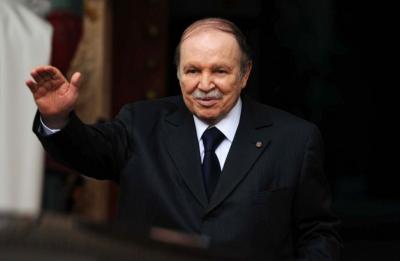Bouteflika’s attempts to stay in power bode ill for Algeria
ABDELKADER CHEREF
|
22 October 2013

NEW YORK - When Abdelaziz Bouteflika returned to Algeria following an absence of three months due to a mini-stroke in April, the world discovered the 76-year-old president using a wheelchair - The image had a strong political significance.
Many observers had thought that Mr Bouteflika’s former plan to amend the constitution and run for a fourth term was a thing of the past. Many were wondering whether he was physically able to govern, or who his successor would be. Then, without warning, the position moved from one where Mr Bouteflika was hors de combat, out of the game and about to be impeached for medical reasons according to Article 88 of the Algerian constitution, to the position where he is getting ready to run for a fourth term.
Mr Bouteflika, who is still recovering and who occasionally meets with the prime minister and the deputy minister of defence in his dressing gown, announced his return with stamina. He reshuffled the cabinet, restructured the intelligence services (known as the DRS) and is poised to remain in power and safeguard the interests of his rentier clan and clientele.
It should be noted that Mr Bouteflika was brought in by the army to save the system. And he got full support from the DRS throughout his terms. Now that he has pulled the rug from under the most powerful of Algeria’s generals, Mohamed Mediene (more often known as Tawfik), who heads the much-feared security services, the common people in Algeria are puzzled. They feel that these “done deals” that are kept away from them could present a real nightmare for the country, because the cabinet reshuffle has been designed to consolidate the authoritarian nature of the regime.
By imposing a close ally, General Salah Gaid, as the army’s chief of staff, Mr Bouteflika has become the key power broker in the country. And as in 2008, when he amended the constitution to remove the two-term limit, he is now mapping the road to another term in office. Though his 2008 amended constitution prohibits “feudal practices, regionalism and nepotism”, the key ministers he has recently appointed are all from his parents’ home region of Tlemcen.
It is obvious that Mr Bouteflika wants to keep his “kingdom” until his last breath. And many observers believe he is now propping up his brother Said Bouteflika to succeed him. But what Mr Bouteflika does not seem to notice is that the international and regional political context driven by the Arab revolts has changed. He should allow for a process that leads to a real transition, instead of essentially turning Algeria’s political system into a hereditary one.
The Arab Spring has ordained new rules. Arabs and Berbers have made it clear that eternal and exclusivist presidents are undesirable. The end of Zine El Abidine Ben Ali, Hosni Mubarak, Ali Abdullah Saleh and even Mohammed Morsi is edifying.
When Mr Bouteflika was sworn in, he took an oath on the Quran to uphold the constitution. And when he felt he was trapped as other Arab presidents were during the apex of the Arab Spring, he promised, in a speech on April 15, 2011, “to implement serious democratic reforms and to allow the opposition access to state media, including radio and television”.
Two years later, his commitments are good for nothing. Algerians still do not have the right to choose their representatives. Elections are rigged. The state-controlled union (the General Union of Algerian Workers, or UGTA) is still run as a mafia. Political parties, unions and associations that do not back the powers that be are subjected to all kinds of pressure. Recently, 16 political parties that were about to hold a public meeting in Algiers to express their opposition to the projected revision of the constitution were refused permission to hold the meeting.
Why does Mr Bouteflika want to cling to power when it is clear that he has failed to get the country going, despite the remarkable foreign-exchange reserves of $190.7 billion (Dh700.4 bn) at his disposal? Commonsense should urge him not to go against an open democratic alternative after a 15-year rule marked by appalling and massive levels of corruption.
In the 1970s and early 1980s, corruption as a phenomenon was of almost no consequence; but with the advent of Mr Bouteflika, corruption has largely been “democratised”. Now it is so widespread that it poses a serious threat to national security.
The latest scandal involving state oil giant Sonatrach is a good example. The former energy minister, and Mr Bouteflika’s very close ally, Chakib Khellil is now sought by Italian authorities. He is suspected of pocketing $1 billion. These days, most foreign businessmen know that the Algerian ruling elite is corrupt.
But it is on the diplomatic front that Algeria has experienced a real debacle. Under Mr Bouteflika, the country has become a mere bystander on the world stage. Ever since he was elected – rather, selected – in 1999, Mr Bouteflika has been the de facto foreign affairs minister. Algeria now plays a minor role in international relations. The country was not engaged in Iraq nor is it now in Syria. Mr Bouteflika was offhand regarding the tragic events in neighbouring Mali. He has made seven trips to Paris and none to the Sahel.
This country, whose glorious war of independence from France has been a paradigm, has now the dishonourable status of “champion of the war on terror” that Paris is always willing to bestow on the regime.
But everyone knows that the Empire’s humanitarian principles are subordinated to its interests. And stability without democracy is not an issue. That is why Mr Bouteflika’s insistence on hijacking the constitution risks eroding the Algerian state.
Dr Abdelkader Cheref is an assistant professor at the State University of New York at Potsdam. This article first appeared in The National, Abu Dhabi


